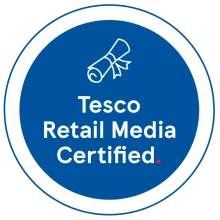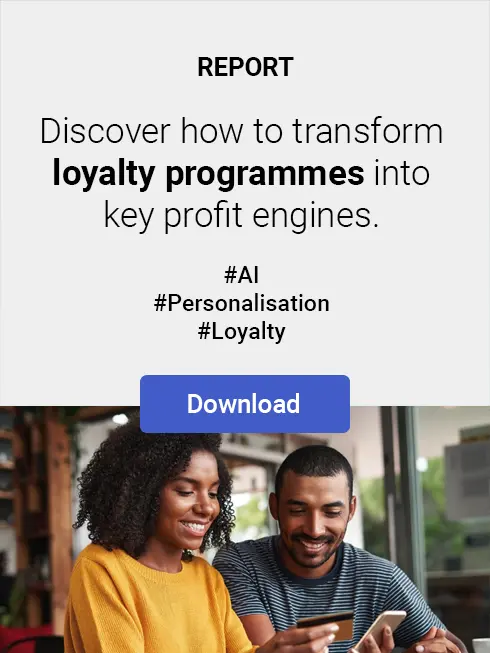Unlocking success: why agency planning teams should get Tesco retail media certified
Accreditations and certifications are now a major part of the media and marketing landscape. From the formal qualifications offered by the Chartered Institute of Marketing through to "own brand" diplomas from the likes of Google and Facebook, media professionals aren’t exactly short of choice when it comes to professional development.
Retail media is something of an exception here, albeit somewhat understandably so. While retail media has technically been around for decades, it’s only in the past five or so years that the discipline has crystallised around a specific set of skills and capabilities. Accreditations have gradually begun to follow; in 2024, for example, Tesco launched the Tesco Retail Media Certification—the UK’s first ever multi-channel retail media accreditation.
While the Certification is open (and free) to all, it has particular relevance to planners within media agencies. And, while planners are typically busy enough as it is, there are very good reasons for them to get certified: personal recognition, smarter campaigns, and better insight into their clients’ customers to name but a few. So, what’s stopping them from diving in?
Understanding the barriers
As someone who works in retail media myself, the natural temptation here is to ask "why wouldn’t you want to gain a retail media certification? Why wouldn’t you want to improve your understanding of one of the fastest growing advertising channels?". At the same time, I can also appreciate that I’m a little bit biased. Looking at it objectively, I can think of some very good reasons that agency planners aren’t running headfirst into the world of retail media.
For a start, there’s the issue of complexity. With its multitude of channels, not to mention the split between physical and digital ad opportunities, retail media is often considered to be one of the most complex advertising disciplines out there. For planners, who typically have a heavy enough workload as it is, learning a new set of skills and capabilities might not sound all that appealing.
Then, there are the misconceptions to consider. In many ways, retail media is a victim of its own success: it’s so good at driving sales that some people have come to believe that conversion is all that retail media is good for. That’s far from the truth, of course, evidenced by a growing number of incredible brand-building retail media campaigns. But if planners feel that retail media is solely a bottom of the funnel activity, it’s another reason not to pay it too much attention.
Both of these issues can turn into real obstacles if there’s no great commercial impetus for an agency or planner to use retail media. If clients aren’t putting the pressure on, taking the time out to learn about something new might feel unnecessary. Why upset the applecart if everything’s running relatively well as it is, after all?
And, finally, there’s the duplication aspect to consider. If an agency’s clients have strong in-house retail media capabilities already, does a planner really need to invest the time and effort needed to match that level of expertise? Aren’t their skills better off being used to compliment what a client can do, rather than replicating it?
Lots of questions and—on the surface, at least—some decent arguments as to why planners might not be interested in earning a certification. The reality, though, is that for every one of those objections, there’s an even better reason to get accredited.
The pros outweigh the cons
Let’s start with what I think is should be the biggest motivator for any planner. Simply, earning a retail media certification shows that they’re thinking progressively.
Innovation, fresh thinking, and creativity are absolutely integral to the advertising and marketing industries. Retail media—which is often referred to as the "third wave" of digital advertising—is one of the fastest-moving and most forward-looking disciplines out there. Gaining a certification in the field signals intent; it shows that a planner isn’t content to just stay in their lane, but is actively thinking about how to deliver additional value to their clients as well.
One of the ways in which they can deliver that value is through a deeper understanding of consumer behaviours. At its core, retail media is a data-driven discipline. In the case of Tesco Media and Insight Platform, for instance, the insights used in the campaign planning process come directly from Tesco Clubcard data. Understanding how people shop—and why they buy what they buy—is instrumental the creation of effective, relevant retail media campaigns.
Those insights aren’t just useful from a retail media perspective, though; they can also help when developing a much broader media strategy. From relatively surface-level insights like where people are most likely to buy your products, through to detailed intelligence into the purchasing habits of specific audience segments, the data that drives retail media’s success can do exactly the same across the wider media ecosystem, too.
A better understanding benefits everybody
As beneficial as it is for an agency to have planners that understand retail media, there’s a rather obvious personal development angle here as well. Media is an increasingly competitive business, one in which capabilities and qualifications can make a genuine difference to the trajectory of somebody’s career. Simply, developing their knowledge of retail media gives planners the edge over their peers.
There’s also an element of future proofing here. Retail media is one of the fastest-growing advertising disciplines, and while we’re not yet at the point of agencies insisting on planners having relevant certifications, the likelihood of that happening is only increasing. Naturally, getting ahead of the curve now means that there’ll be less to catch up on further down the line. The speed at which retail media is evolving makes that almost essential.
Last—but by no means least—there’s the issue of client relationships, something that goes back to one of the "objections" that I noted above. When brands have good retail media capabilities in-house already, there are two ways to look at things. You could, as mentioned earlier, leave them to handle that side of things themselves. The better approach, though, is to enhance your own skills to the extent that you can proactively engage with them on the subject.
Agencies, after all, are meant to act as intermediaries between inventory owners (like retailers) and their own clients. With retail media becoming an increasingly attractive proposition for brands, it’s crucial for agencies to ensure that they remain part of the conversation.
No-one wants to be cut out of the loop, after all.
The Tesco Retail Media Certification gives media professionals from across the industry the chance to learn more about one of today’s fastest-growing forms of advertising. Register for free here and begin your retail media journey.
Tesco Retail Media Certification

Whether just starting out in retail media, or coming equipped with years of experience, this free training platform gives participants everything they need to power up their proficiency, hone their skills and understand the role Tesco can play on a media plan.
- Understand what is driving retail media’s stratospheric rise and how it has become a brand marketing essential.
- Discover the dynamics of the UK grocery market and how actionable insights from Clubcard fuel everything Tesco does.
- Learn how Tesco’s media solutions enhance the customer experience, close the marketing loop, and leverage the scale, precision and reach of Tesco.
Become Tesco Retail Media Certified and sign-up for free today, visit https://www.dunnhumby.com/tesco-retail-media-academy/
TOPICS
RELATED PRODUCTS
Tesco Media and Insight Platform is a partnership between Tesco and dunnhumby, utilising customer insights to create full-funnel retail media advertising.
Learn more and 'Shape What Britain Buys'.Get in touch
Contact us to learn more about our Retail Media solutions, we're here to help.
Contact usThe latest insights from our experts around the world
How to overcome assortment challenges? Lessons from history
Smart Retail: AI cheat sheet for retail execs
How do retailers integrate one loyalty programme into another?




